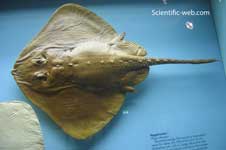The Thornback ray (Raja clavata) or Thornback skate is a species of fish in the Rajidae family. it is found in coastal waters of Europe and the Atlantic coast of Africa, possibly as far south as Namibia and even South Africa. Its natural habitats are open seas and shallow seas. It is sometimes seen trapped in large estuarine pools at low tide. Description The thornback ray is probably one of the commonest rays encountered by divers. Like all rays it has a flattened body with broad, wing-like pectoral fins. The body is kite-shaped with a long, thorny tail. The back is covered in numerous thorny spines, as is the underside in older females.[1] Adult fish can grow to 1 m (3.3 ft) in length although most are less than 85 cm (33.67 in). This ray can weigh from 4.5 to 8.75 lb (2 to 3.98 lb).[2] In sexually mature fish some of the spines are thickened with button-like bases (known as bucklers). These are particularly well developed on the tail and back of sexually mature females. The colour varies from light brown to grey with darker blotches and numerous small darker spots and yellow patches. Sometimes the yellow patches are surrounded by small dark spots. The underside is creamy-white with a greyish margin. Habitat The thornback ray is usually found on sediment type seabeds such as mud, sand or gravel at depths between 10-60m. Juvenile fish feed on small crustaceans, particularly amphipods and bottom-living shrimps, Adults feed on crabs, shrimps and small fish. References
http://www.habitas.org.uk/marinelife/species.asp?item=ZF1360 Retrieved from "http://en.wikipedia.org/" |
|

